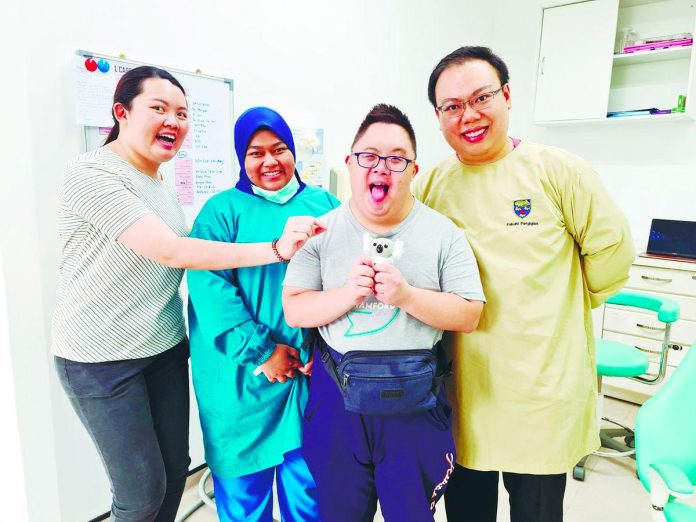WHEN Dr Aarthi Nagarathinam was pursuing her basic degree in dentistry, she observed many patients with complications such as behaviour related problems, stroke patients, cerebral palsy and those with learning disabilities, but she lacked the knowledge and experience to treat them.
Fortunately, she decided to pursue her interest in the area, and is currently completing her doctorate in special care dentistry at Universiti Malaya (UM), Faculty of Dentistry, while working in the unit.
Dr Aarthi belongs to a new breed of dentists who do not only focus on managing oral health, but on dental care for patients with diverse impairments. The setting up of a Special Care Dentistry (SCD) unit under the Faculty of Dentistry in Universiti Malaya began in 2012.
As Malaysia moves towards an ageing population, it becomes increasingly important to meet the needs of those with dementia, stroke, cancer and in general building community care for those in need of it. Unfortunately, Malaysia only has 14 specialists currently in SCD units and the need is growing due to the rising number of dental patients with complications.
The importance of special care dentistry
Associate Professor Dr Maryani Mohamed Rohani, who currently heads the SCD unit, at the Faculty of Dentistry in UM feels there is a great need for the public to be aware of the importance of special care dentistry.
“The list of complicated cases keeps increasing, especially those in need of customised treatment.
“In the early days, when those with learning disabilities had problems or cavities in their teeth, the only solution was to put them under anesthetic and extract their teeth. Today they have other options as they can come to SCD unit and receive treatment,” said Dr Maryani, a scholarship student who completed her basic degree at UM, and then went on to complete her postgraduate degree, Doctor in Clinical Dentistry, at Melbourne University.
“We sometimes have to arrange house calls for those stroke patients, even those with brain injury and we have to carry our equipment with us. With a brain injury, they cannot control their mouth movement and care has to be taken to ensure they do not choke, when undergoing dental treatment.”
Dr Maryani said it is not easy to deal with those adults that have learning disabilities and time plus effort is needed to gain his or her trust as they are adults.
“We spend time to gain their trust so they will sit in the dental chair and feel comfortable undergoing treatment. We had an autistic patient, who suddenly jumped up during treatment and so we had to put him under anesthetic as we could not control his behaviour.
“These decisions are made after careful consideration.
“As a SCD unit, we also engage in community care, visiting nursing homes and orphanages to create awareness on the unit and its services,” she added.
Since 2020, according to Dr Maryani, the SCD unit has treated over 400 patients with complicated dental care needs, including those involved in accidents and those with neurological problems.
As the mother of a special child, D. Preeya Nanthini, who is dyspraxic, I came into contact with the SCD unit when Nanthini developed severe gingivitis recently. It was obvious that the normal dentist was unable to deal with the problem as Nanthini was restless and in great pain when she went to the private dentist for her treatment.
When I first visited the SCD Unit, I was pleasantly surprised by the well-laid out dentist chairs in pink and green and the friendly atmosphere which put Nanthini at ease.
Dr Lynn Ko, who conducted the treatment for one year proved experienced in dealing with special needs cases. They engaged in many fun activities including singing songs to distract Nanthini and other special needs children so they felt at ease. Dr Lynn is currently completing her postgraduate studies in special care dentistry.
Communities eligible for SCD
Dr Maryani said they whole department is engineered towards their special care patients, with extra-large spaces to accommodate those in wheel-chairs.
“All those who work in this section have undergone special training so they can deal with the different types of patients who come here.”
“The communities we serve are those aged 16 and above, with physical, intellectual, sensory, psychiatric or multiple disabilities.
“Those with complex medical conditions, geriatric patients, residents of nursing homes, those with special behaviour problems and the broader underserved and marginalised communities, such as refugees and participants of programmes as the Special Olympics Malaysia,” she added.
“As a pioneer in the field, we also act as a training ground for those dentists currently pursuing the Doctor in Special Care Dentistry postgraduate programme.”








